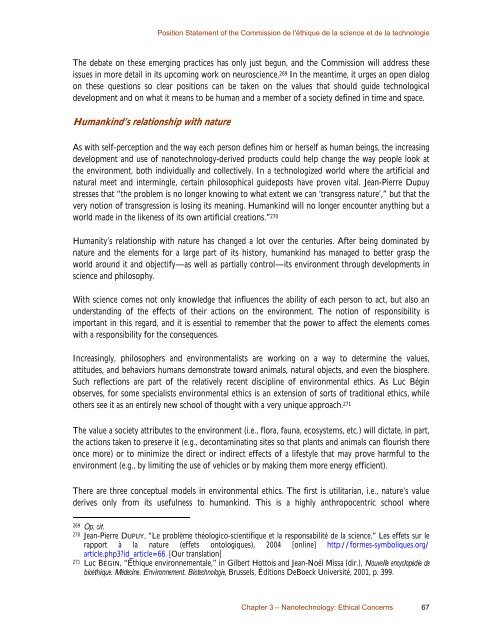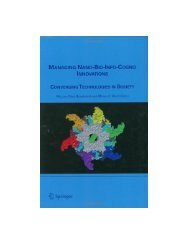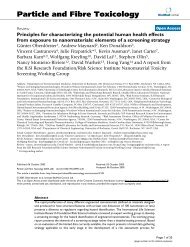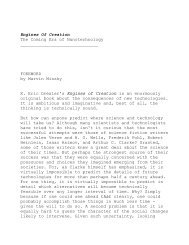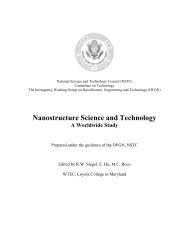A Basis for Action - Commission de l'éthique de la science et de la ...
A Basis for Action - Commission de l'éthique de la science et de la ...
A Basis for Action - Commission de l'éthique de la science et de la ...
Create successful ePaper yourself
Turn your PDF publications into a flip-book with our unique Google optimized e-Paper software.
Position Statement of the <strong>Commission</strong> <strong>de</strong> l'éthique <strong>de</strong> <strong>la</strong> <strong>science</strong> <strong>et</strong> <strong>de</strong> <strong>la</strong> technologie<br />
The <strong>de</strong>bate on these emerging practices has only just begun, and the <strong>Commission</strong> will address these<br />
issues in more <strong>de</strong>tail in its upcoming work on neuro<strong>science</strong>. 269 In the meantime, it urges an open dialog<br />
on these questions so clear positions can be taken on the values that should gui<strong>de</strong> technological<br />
<strong>de</strong>velopment and on what it means to be human and a member of a soci<strong>et</strong>y <strong>de</strong>fined in time and space.<br />
Humankind’s re<strong>la</strong>tionship with nature<br />
As with self-perception and the way each person <strong>de</strong>fines him or herself as human beings, the increasing<br />
<strong>de</strong>velopment and use of nanotechnology-<strong>de</strong>rived products could help change the way people look at<br />
the environment, both individually and collectively. In a technologized world where the artificial and<br />
natural me<strong>et</strong> and intermingle, certain philosophical gui<strong>de</strong>posts have proven vital. Jean-Pierre Dupuy<br />
stresses that “the problem is no longer knowing to what extent we can ‘transgress nature’,” but that the<br />
very notion of transgression is losing its meaning. Humankind will no longer encounter anything but a<br />
world ma<strong>de</strong> in the likeness of its own artificial creations.” 270<br />
Humanity’s re<strong>la</strong>tionship with nature has changed a lot over the centuries. After being dominated by<br />
nature and the elements <strong>for</strong> a <strong>la</strong>rge part of its history, humankind has managed to b<strong>et</strong>ter grasp the<br />
world around it and objectify—as well as partially control—its environment through <strong>de</strong>velopments in<br />
<strong>science</strong> and philosophy.<br />
With <strong>science</strong> comes not only knowledge that influences the ability of each person to act, but also an<br />
un<strong>de</strong>rstanding of the effects of their actions on the environment. The notion of responsibility is<br />
important in this regard, and it is essential to remember that the power to affect the elements comes<br />
with a responsibility <strong>for</strong> the consequences.<br />
Increasingly, philosophers and environmentalists are working on a way to <strong>de</strong>termine the values,<br />
attitu<strong>de</strong>s, and behaviors humans <strong>de</strong>monstrate toward animals, natural objects, and even the biosphere.<br />
Such reflections are part of the re<strong>la</strong>tively recent discipline of environmental <strong>et</strong>hics. As Luc Bégin<br />
observes, <strong>for</strong> some specialists environmental <strong>et</strong>hics is an extension of sorts of traditional <strong>et</strong>hics, while<br />
others see it as an entirely new school of thought with a very unique approach. 271<br />
The value a soci<strong>et</strong>y attributes to the environment (i.e., flora, fauna, ecosystems, <strong>et</strong>c.) will dictate, in part,<br />
the actions taken to preserve it (e.g., <strong>de</strong>contaminating sites so that p<strong>la</strong>nts and animals can flourish there<br />
once more) or to minimize the direct or indirect effects of a lifestyle that may prove harmful to the<br />
environment (e.g., by limiting the use of vehicles or by making them more energy efficient).<br />
There are three conceptual mo<strong>de</strong>ls in environmental <strong>et</strong>hics. The first is utilitarian, i.e., nature’s value<br />
<strong>de</strong>rives only from its usefulness to humankind. This is a highly anthropocentric school where<br />
269 Op. cit.<br />
270 Jean-Pierre DUPUY, “Le problème théologico-scientifique <strong>et</strong> <strong>la</strong> responsabilité <strong>de</strong> <strong>la</strong> <strong>science</strong>,” Les eff<strong>et</strong>s sur le<br />
rapport à <strong>la</strong> nature (eff<strong>et</strong>s ontologiques), 2004 [online] http://<strong>for</strong>mes-symboliques.org/<br />
article.php3?id_article=66. [Our trans<strong>la</strong>tion]<br />
271 Luc BÉGIN, “Éthique environnementale,” in Gilbert Hottois and Jean-Noël Missa (dir.), Nouvelle encyclopédie <strong>de</strong><br />
bioéthique. Mé<strong>de</strong>cine. Environnement. Biotechnologie, Brussels, Éditions DeBoeck Université, 2001, p. 399.<br />
Chapter 3 – Nanotechnology: Ethical Concerns 67


